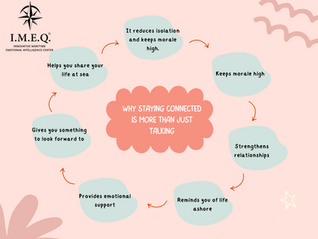Proactive Mental Wellness: Guiding Officers in Monitoring Crew Psychological Health Onboard
- IMEQ CENTER

- Sep 1, 2023
- 3 min read
Updated: Sep 12, 2023

Detecting signs of psychological distress or mental health issues among crew members on board a vessel is crucial for the safety and well-being of all on board. Officers, given their leadership roles, play a vital role in monitoring and supporting their crew.
Before diving into the how-tos, it's essential to grasp the relevance of psychological health at sea. Just as physical injuries can hinder a crew member's capacity to perform their duties, psychological distress can also impair judgment, focus, and decision-making abilities. Moreover, poor mental health can breed conflict amongst crew members, leading to a hostile work environment that affects everyone on board.
Moreover officers should be trained to recognize early signs of psychological distress in crew members. These might include:
Noticeable changes in mood or behavior
Withdrawal from social interactions
Excessive fatigue or lack of energy
Decline in work performance or increased forgetfulness
Overreaction to minor setbacks or criticisms
Increased consumption of alcohol or drugs
Talk of self-harm, hopelessness, or suicide
Yet, one of the most effective ways to support crew members' psychological health is by fostering a supportive environment. Officers can:
Initiate regular team meetings where everyone is encouraged to share their feelings and concerns.
Organize recreational activities to break the monotony and encourage bonding.
Facilitate open communication. Ensure that crew members feel they can approach officers with their problems without fear of retribution.
Mental health issues often come with an unwarranted stigma. Officers should lead by example by addressing this head-on:
Educate the crew about the commonality and normalcy of mental health issues.
Discourage mocking, teasing, or gossiping about someone's mental health.
Share resources and testimonials, which might help dispel myths around psychological well-being.
Should an officer suspect a crew member is in distress, they must approach the situation delicately:
Engage the individual in a private conversation. Express concern without being confrontational.
Avoid making judgments or diagnoses.
If the situation is severe, especially if there's talk of self-harm, officers should consider involving medical professionals and informing the ship's captain.
Maintain confidentiality, unless there's a risk to the individual or others.
For officers to effectively support their crew's psychological health, they need training. Periodic workshops focusing on:
Recognizing signs of distress
Effective communication strategies
Intervention techniques
Familiarity with referral resources, both onboard and ashore
Here are some psychological aid tips for officers to identify potential concerns:
Regular Communication: Foster an environment where crew members feel comfortable discussing their feelings and concerns. Regular check-ins can help detect any early signs of distress.
Observe Behavioral Changes: Monitor for any abrupt changes in a crew member's behavior, including increased isolation, irritability, or altered sleep and eating patterns.
Be Alert to Physical Signs: Symptoms like frequent headaches, stomach issues, fatigue, or a decline in personal hygiene might be indicative of underlying psychological distress.
Monitor Work Performance: A sudden drop in work quality, lack of concentration, or increased forgetfulness can be signs of mental health issues.
Listen Actively: If a crew member does open up, listen without judgment. Sometimes, being heard can be a significant first step in addressing psychological distress.
Encourage Peer Support: Train the crew to support and look out for each other. Sometimes, peers might notice subtle changes before an officer does.
Provide Mental Health Training: Offer training sessions on mental health awareness, which can equip both officers and crew with the tools to recognize and address psychological concerns.
Establish Clear Reporting Mechanisms: Ensure that there's a clear and confidential system in place for crew members to report concerns about their own mental health or that of their peers.
Promote Work-Life Balance: Even on board, try to ensure that crew members have adequate rest periods, opportunities for recreation, and time to communicate with loved ones.
Offer Resources: Have materials available about mental health, including information on recognizing signs of distress and steps to take if someone is struggling.
Emergency Preparedness: Ensure that there's a plan in place for dealing with severe mental health crises, including potential suicidal ideation or behavior.
Reduce Stigma: Regularly discuss the importance of mental health, emphasizing that it's as vital as physical health and that there's no shame in seeking help.
Stay Updated: Mental health guidelines and best practices can evolve. Officers should periodically refresh their knowledge and skills in this area.
Remember, early detection and intervention can prevent more serious issues down the line. Creating a supportive environment on board where everyone looks out for one another can go a long way in ensuring the psychological well-being of the crew.





































































































Simple phrases can have huge impact on someone who is struggling with any sort of problem! Simple phrases include : “How are you today” “ How is everything going for you” “hello my friend” simple phrases can alleviate the stress and open the door for connecting to another human being😊